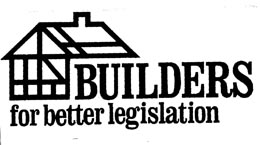In June 1977, the Seattle Master Builders Association announces the formation of Builders For Better Legislation, a political action committee to support candidates for state and local offices who share the philosophy and goals of the organization. The committee later widens its focus to include involvement in the legislative process through the active lobbying of legislators and policy makers. In 1982 the committee will be renamed the Affordable Housing Council to better reflect its diverse membership, which includes many non-builders, and to focus attention on the overarching goal of assuring affordable housing.
Meeting a Need
The formation of Builders for Better Legislation was a response by the builders' association to increasing regulation of the industry at both the state and local level and "a positive reaction to the need for a political action council to support good government" (Master Builder, June 1977, p. 7). Its role initially was limited to "supporting those candidates who demonstrate the ability to protect and promote the free enterprise system" (Master Builder, June 1977, p. 7).
Under the direction of its first co-chairs, developer Jim Harkey and builder Norm Davis, the committee concentrated on expanding its membership and raising funds to support its activities. By September 1977 more than 35 companies had pledged their support, and others were soon to follow. Over the next three years, association volunteers ran the committee, and although it enjoyed some successes it was soon clear that there was a need for both a wider scope of activities and a professional, full-time director. As association president Paul Nolan told the membership in July 1980:
"We have gained a great deal of insight into the political process during the past few months and especially what our industry needs to become a more effective political force in Olympia. Legislation that may be either favorable or unfavorable to our industry begins to develop long before the legislative session is convened ... . We discovered that just as we have become involved in city and county regulation at its initial stages, so must we become involved in state legislation at its inception, rather than after final drafts are developed" (Master Builder, July 1980, p. 6).
Two months later, in September 1980, the association appointed a former employee of the Washington State House of Representatives, Mary Mauerman, as its full-time legislative coordinator and lobbyist. The following November, Builders For Better Legislation kicked off the "Build-a-House" fundraising campaign. SMBA members contributed labor and materials to build a house which was then sold, with the profits used to finance the activities of the political action committee.
New Name, Greater Clout
During this same period the SMBA joined forces with the Home Builders Association of Washington to address legislative concerns of statewide import. The coalition expanded its lobbying activities and also began drafting legislative proposals, one of the first of which was a series of amendments to the state building code.
As the political action committee expanded its activities, a consensus developed that the name "Builders for Better Legislation" did not adequately reflect either the diversity of its membership or the real focus of its legislative activities. A subcommittee was appointed to consider the issue, and its recommendation that the name be changed to the "Affordable Housing Council" was formally adopted by the association's board of trustees in February 1982.
By the end of 1982, the Affordable Housing Council could report to the association's membership that more than $40,000 had been spent supporting candidates for the state legislature and funding an initiative campaign. Candidates supported by the council had won 63 percent of the contested races. Over the course of just five years, the Master Builders' lobbying effort had grown from virtually nil to a well-financed and professional political action committee, one of the largest in the state at the time.

